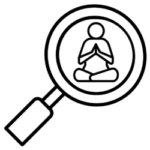ICM:2024 connection events
When you join us at Bangor University for ICM:2024, you’ll discover a wealth of extra options for informal networking and social interactions. In addition to the main programme, there will be an unmissable conference dinner and a chance to explore the latest research poster presentations.
Planned events during the conference weekend include an art exhibition by Stephen Batchelor and Anne Spekens, a ‘meet the author’ session, special conference pop up food events, and a locally guided walk of Bangor. From August 2-6, enjoy the best of Bangor and all that the thriving mindfulness community has to share.
These events are open to the public. Buy your conference pass here.
Conference Dinner
Join us for the conference dinner to enjoy a delightful evening of insightful discussions, networking, and delicious food. We are honored to feature speakers Chris Ruane and Bangor University's esteemed Professor Oliver Turnbull.
Saturday, 3 August, 19:00 - 21:00 (more details will be provided after registration)
Buy your Conference Dinner Ticket here:
mindful art
We are delighted that meditation teachers and artists Stephen Batchelor and Anne Speckens will be showcasing a selection of their art at the conference (Friday until Sunday, Powys, Main Arts Building).
There will also be two talks by Anne and Stephen:
Friday 2 August, 20:00-21;00, Powys (Main Arts Building)
Anne and Stephen will participate in a conversation about their art with Christoph Spiessens. With the works at hand, they will talk about how their interest in art came about, what the process of making art looks like, and how mindfulness comes into the picture… Or not! This will include an audience Q&A opportunity.
Sunday 4 August, 12:00 - 13:15, Powys (Main Arts Building)
Anne and Stephen will give a talk based on their exhibits entitled, “Weavings of Fishing Nets: The Ephemerality of Life” and “Collages: Turning Rubble into Gold” respectively.
Anne says: “I am applying different techniques in my art: drawing, watercolour painting, making collages and weaving. Often, I am re-using leftover materials that have been thrown away, such as fishing materials from the beach, cardboard, wallpaper, socks wool, cloth, carpeting, electric wires. I am taking things apart and getting them together in a renewed way. The themes I am touched by are impermanence, the ephemerality of life and transformation. I am giving a new life to things while their past lives are still shining through.”
Stephen says: “I have been making collages from found materials for the past twenty-five years. I collect pieces of paper, plastic and cloth that have been discarded as useless, then re-assemble them into mosaics designed according to fixed rules. These worthless things are thereby given a second life as aesthetic objects. My art practice requires paying constant mindful attention to things in our world that we tend to overlook or reject as “rubbish” in order to transform them into something of potential value and meaning.”
Does the practice of mindfulness help or hinder the creative process? Or can you be creative without being mindful at all? In this session, Anne and Stephen will explore these questions from their perspectives as long-term mindfulness practitioners and teachers as well as being artists. Stephen will present a four-step theory of creativity based on an interpretation of the Buddhist doctrine of “miraculous powers” (iddhi), thereby suggesting how mindfulness and creativity might serve as integral elements of a common ethical ecosystem. Anne will provide the perspective of a mindfulness teacher and researcher. How does creativity support these roles? And how does it differ from being an artist?
They are looking forward to welcoming you to their talks on Friday and Sunday!
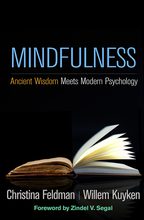 How does mindfulness promote psychological well-being? What are its core mechanisms? What value do contemplative practices add to approaches that are already effective? From leading meditation teacher Christina Feldman and distinguished psychologist Willem Kuyken, this book provides a uniquely integrative perspective on mindfulness and its applications. The authors explore mindfulness from its roots in Buddhist psychology to its role in contemporary psychological science. In-depth case examples illustrate how and why mindfulness training can help people move from distress and suffering to resilience and flourishing. Readers are guided to consider mindfulness not only conceptually, but also experientially, through their own journey of mindfulness practice.
How does mindfulness promote psychological well-being? What are its core mechanisms? What value do contemplative practices add to approaches that are already effective? From leading meditation teacher Christina Feldman and distinguished psychologist Willem Kuyken, this book provides a uniquely integrative perspective on mindfulness and its applications. The authors explore mindfulness from its roots in Buddhist psychology to its role in contemporary psychological science. In-depth case examples illustrate how and why mindfulness training can help people move from distress and suffering to resilience and flourishing. Readers are guided to consider mindfulness not only conceptually, but also experientially, through their own journey of mindfulness practice.
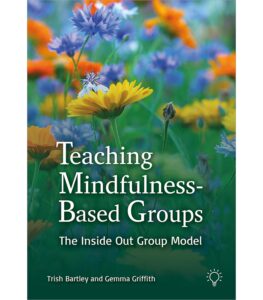 Teaching Mindfulness-Based Groups
Teaching Mindfulness-Based Groups
Mindfulness-based programs were designed to be taught in groups, yet there is little or no information on how to work with the potential of a group to enhance the learning of participants. Based on a sound theoretical model, this book fills that gap.
Mindfulness-Based Cognitive Therapy for Cancer: Gently Turning Towards
Mindfulness-based Cognitive Therapy for Cancer presents an eight-week course for MBCT which has been tried and tested clinically, and is targeted specifically for people with cancer.
- There is growing evidence of mindfulness as a successful and cost-effective intervention for reducing the negative psychological impact of cancer and treatment
- Draws upon the author’s experience of working with people with cancer, and her own recent experience of using mindfulness with cancer diagnosis and treatment
- Stories from cancer patients illustrate the learning and key themes of the course
- Includes new short practices and group processes developed by the author
Mindfulness: A Kindly Approach to Being with Cancer
Mindfulness: A Kindly Approach to Being with Cancer offers people with cancer a means to bring mindfulness and kindliness into their lives, to help them cope with the challenge of a life-threatening illness.
- Adapts Mindfulness-Based Cognitive Therapy (MBCT), an approach with a strong evidence base for people with recurrent depression, for the needs and challenges of people with cancer
- Presents the standard 8-week course of MBCT for cancer in a flexible format that is designed to suit each reader’s own particular timescale, context and situation
- Based on more than 15 years of program development and clinical application by the author, and the work and experience of mindfulness teachers in other cancer centres around the world
- Provides specific practices and approaches tailored to support the different phases of a cancer experience – from diagnosis and treatment to living with uncertainty and managing life with cancer
- Features five extended stories from people personally affected by cancer who have used mindfulness-based practices to support them in their own experience of illness, life and treatment
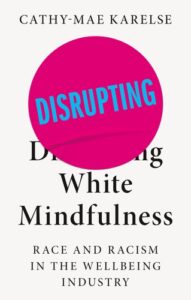 Disrupting White Mindfulness offers a timely commentary on the dominant narratives that shape the mindfulness industry – whiteness, postracialism and neoliberalism. Its positioning as ‘apolitical’ forges institutions that fit comfortably into increasingly divided societies. The race-gender profile of these institutions reveals a White, middle-class profile of decision-makers, educators and staff that is mirrored in its audiences. Mechanisms that recycle the industry’s whiteness include corporatist pedagogies, edicts of authority, disengagement with difference and inappropriate uses of mindfulness that distance People of the Global Majority. A growing emergent movement focused on a justice-infused mindfulness and liberatory wellbeing decolonises mindfulness and de-centres whiteness. Its premise in indigenous, global South, queer knowledges leverages difference to produce multiple solutions focused on liberation. There is room for White Mindfulness to change.
Disrupting White Mindfulness offers a timely commentary on the dominant narratives that shape the mindfulness industry – whiteness, postracialism and neoliberalism. Its positioning as ‘apolitical’ forges institutions that fit comfortably into increasingly divided societies. The race-gender profile of these institutions reveals a White, middle-class profile of decision-makers, educators and staff that is mirrored in its audiences. Mechanisms that recycle the industry’s whiteness include corporatist pedagogies, edicts of authority, disengagement with difference and inappropriate uses of mindfulness that distance People of the Global Majority. A growing emergent movement focused on a justice-infused mindfulness and liberatory wellbeing decolonises mindfulness and de-centres whiteness. Its premise in indigenous, global South, queer knowledges leverages difference to produce multiple solutions focused on liberation. There is room for White Mindfulness to change.
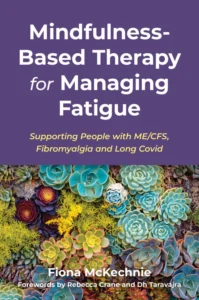 Mindfulness-Based Therapy for Managing Fatigue by Fiona McKechnie is based on an 8-week Mindfulness-based Cognitive Therapy programme, this guide addresses the increasing need for adapted mindfulness in the management of ME/CFS, fibromyalgia, Long Covid, and other chronic fatigue conditions.
Mindfulness-Based Therapy for Managing Fatigue by Fiona McKechnie is based on an 8-week Mindfulness-based Cognitive Therapy programme, this guide addresses the increasing need for adapted mindfulness in the management of ME/CFS, fibromyalgia, Long Covid, and other chronic fatigue conditions.
Using current understanding and theoretical approaches to Long Covid and ME/ CFS, this book allows practitioners to understand how they can adapt their teaching to accommodate patients with specific needs and challenges, including adaptations for brain fog, approaches to rest, movement, daily activity and accompanying difficult thoughts and emotions. Contributions from people who manage ME, fibromyalgia and chronic fatigue through mindfulness are included alongside practical guidance and detailed week-by-week session plans whether that’s in-person or online. Filled with helpful diagrams and illustrations, practitioners can use this guide to greatly widen the scope of who they can reach and gently empower clients living with often isolating conditions on how to apply this approach in the long-term to their everyday lives.
The Buddha taught the practices of loving kindness, compassion,
In a world that often encourages self-centeredness and individual pursuits, The Subtle Art of Caring by River Wolton offers a refreshing perspective that explores the profound impact of compassion in our lives. This thought-provoking book takes readers on a transformative journey, guiding them to unlock the true potential of caring and its ability to create meaningful connections and enhance personal growth.
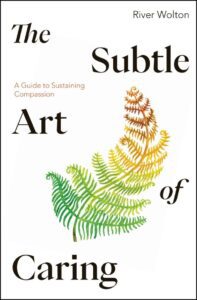 The Subtle Art of Caring by River Wolton is a groundbreaking book that challenges societal norms and encourages readers to embrace compassion as a transformative force. By emphasising the power of caring and nurturing authentic connections, Wolton offers a refreshing perspective that resonates deeply with readers seeking a more fulfilling and purposeful life. Through practical strategies and thought-provoking insights, this book provides the tools necessary to cultivate empathy, both for oneself and others. By reading this book, you will embark on a remarkable journey that not only enhances personal growth but also empowers you to make a positive impact on the world around you.
The Subtle Art of Caring by River Wolton is a groundbreaking book that challenges societal norms and encourages readers to embrace compassion as a transformative force. By emphasising the power of caring and nurturing authentic connections, Wolton offers a refreshing perspective that resonates deeply with readers seeking a more fulfilling and purposeful life. Through practical strategies and thought-provoking insights, this book provides the tools necessary to cultivate empathy, both for oneself and others. By reading this book, you will embark on a remarkable journey that not only enhances personal growth but also empowers you to make a positive impact on the world around you.
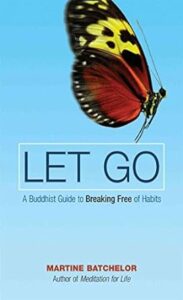 Let Go: A Buddhist Guide to Breaking Free of Habits
Let Go: A Buddhist Guide to Breaking Free of Habits
When we break free from the habits that limit us, a new world of possibilities opens up. In Let Go, Martine Batchelor leads the way there.
Negative patterns of mind may manifest as fear, avoidance, depression, addiction, judgment of self or other, and any of a host of other physical, mental, or psychological forms. Let Go aims at understanding what really lies at the root of these behaviours so we can reclaim control. Each chapter concludes with an exercise or guided meditation as a tool for the reader to work with negative habits in new and creative ways. You don’t have to be a Buddhist for them to work. You just need to want to move on.
Helpful exercises and guided meditations – designed to build understanding of our negative habits, as well as the confidence and skill needed to instead embrace our greatest qualities – appear throughout the book.
Batchelor also looks at Mindfulness-Based Cognitive Therapy (MBCT) for depression, Dr. Jeffrey Schwartz’s use of meditation to deal with Obsessive-Compulsive Disorder (OCD), successful combinations of meditation and Twelve-Step programs, and offers her own innovations.
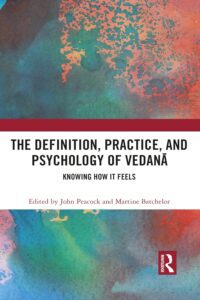 The Definition, Practice, and Psychology of Vedana: Knowing How It Feels
The Definition, Practice, and Psychology of Vedana: Knowing How It Feels
This book examines the importance of the topic of ‘feeling tone’ (vedanā) as it appears in early Buddhist texts and practice, and also within contemporary, secular, mindfulness-based interventions.
The volume aims to highlight the crucial nature of the ‘feeling tone’ or ‘taste of experience’ in determining mental reactivity, behaviour, character, and ethics. In the history of Buddhism, and in its reception in contemporary discourse, vedanā has often been a much-neglected topic, with greater emphasis being accorded to other meditational focuses, such as body and mind. However, ‘feeling tone’ (vedanā) can be seen as a crucial pivotal point in understanding the cognitive process, both in contemporary mindfulness and meditation practice within more traditional forms of Buddhism. The taste of experience, it is claimed, comes as pleasant, unpleasant, and neither pleasant nor unpleasant – and these ‘tones’ or ‘tastes’ inevitably follow from humans being embodied sensory beings. That experience comes in this way is unavoidable, but what follows can be seen in terms of reactivity or responsiveness.
This book was originally published as a special issue of Contemporary Buddhism.
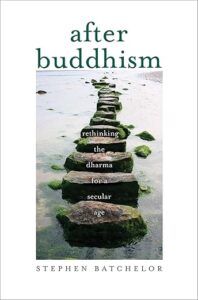 After Buddhism: Rethinking the Dharma for a Secular Age
After Buddhism: Rethinking the Dharma for a Secular Age
Some 25 centuries after the Buddha started teaching, his message continues to inspire people across the globe, including those living in predominantly secular societies. What does it mean to adapt religious practices to secular contexts? Stephen Batchelor, an internationally known author and teacher, is committed to a secularized version of the Buddha’s teachings. The time has come, he feels, to articulate a coherent, ethical, contemplative, and philosophical vision of Buddhism for our age.
After Buddhism, the culmination of four decades of study and practice in the Tibetan, Zen, and Theravada traditions, is his attempt to set the record straight about who the Buddha was and what he was trying to teach. Combining critical readings of the earliest canonical texts with narrative accounts of five members of the Buddha’s inner circle, Batchelor depicts the Buddha as a pragmatic ethicist rather than a dogmatic metaphysician. He envisions Buddhism as a constantly evolving culture of awakening whose perpetual survival is due to its capacity to reinvent itself and interact creatively with each society it encounters. This original and provocative book presents a new framework for understanding the remarkable spread of Buddhism in today’s globalized world. It also reminds us of what was so startling about the Buddha’s vision of human flourishing.
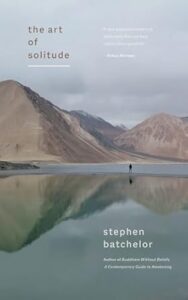 The Art of Solitude
The Art of Solitude
When world-renowned Buddhist writer Stephen Batchelor turned 60, he took a sabbatical from his teaching and turned his attention to solitude, a practice integral to the meditative traditions he has long studied and taught. He aimed to venture more deeply into solitude, discovering its full extent and depth.
This beautiful literary collage documents his multifaceted explorations. Spending time in remote places, appreciating and making art, practicing meditation and participating in retreats, drinking peyote and ayahuasca, and training himself to keep an open, questioning mind have all contributed to Batchelor’s ability to be simultaneously alone and at ease. Mixed in with his personal narrative are inspiring stories from solitude’s devoted practitioners, from the Buddha to Montaigne, and from Vermeer to Agnes Martin.
In a hyperconnected world that is at the same time plagued by social isolation, this book shows how to enjoy the inescapable solitude that is at the heart of human life.
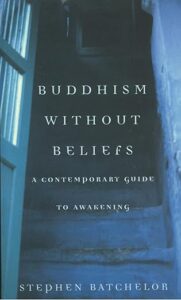 Buddhism without Beliefs
Buddhism without Beliefs
Before it was a religion, a culture, or even a system of meditation, what was Buddhism? On Buddhism Without Beliefs, celebrated teacher, translator, and former Buddhist monk Stephen Batchelor takes us back to the first years after the Buddha’s awakening to reveal the root insights of Buddhism hidden beneath centuries of history and interpretation.
In eight compelling sessions of self-inquiry – including many fascinating exercises and practices – we learn how to awaken and refine our senses, introduce the essential spirit of curiosity into the practice of awareness, and comprehend with both our hearts and our minds the Buddha’s astonishing (and often misunderstood) revelations on emptiness, compassion, and the self. Before he died, the Buddha did not appoint a successor. He simply remarked that each of us must be responsible for our own freedom.
Buddhism without Beliefs is an invitation to hear what the Buddha taught – and to trust yourself on your own path to liberation.
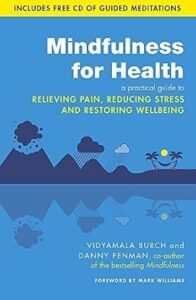 Mindfulness for Health: A Practical Guide to Relieving Pain, Reducing Stress and Restoring Well-Being
Mindfulness for Health: A Practical Guide to Relieving Pain, Reducing Stress and Restoring Well-Being
Pain, suffering, and stress can be intolerable – but it doesn’t have to be this way. Mindfulness for Health reveals a set of simple practices that you can incorporate into daily life to relieve chronic pain, suffering and stress. Clinical trials show that mindfulness meditation is at least as effective as the most commonly prescribed painkillers and can be more powerful than morphine. Mindfulness can also significantly reduce the anxiety, depression, irritability, exhaustion and insomnia that can arise from chronic pain and illness.
Mindfulness for Health is based on a unique meditation programme developed by Vidyamala Burch to help her cope with the severe pain of a spinal injury. The Breathworks Centre founded by Vidyamala – and its affiliates around the world – have helped thousands of people cope with pain, illness and stress. Its pioneering approach is praised by Professor Mark Williams of Oxford University, Jon Kabat Zinn, and Professor Lance McCraken of King’s College London. The eight-week programme at the heart of this book takes just 10-20 minutes per day. You’ll be surprised by how quickly your suffering melts away, leaving behind a deep-seated love of life. This title includes eight guided meditations which appear throughout the audio, as well as being collected at the end.
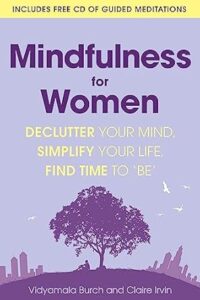 Mindfulness for Women: Declutter Your Mind, Simplify Your Life, Find Time to ‘Be’
Mindfulness for Women: Declutter Your Mind, Simplify Your Life, Find Time to ‘Be’
No matter who we are, or what stage of life we are at, we all long for similar things; to be happy, connected with others, in touch with a sense of calm and peace, vital, alive and joyful. And we long to be able to ride out the tough patches that hit all of us from time to time with some degree of grace and dignity.
The good news is that we can fulfil these longings at any time, in any place. They are only a moment away, a breath away. We can learn how to be comfortable with our body, know and understand our mind, and love our heart. It isn’t difficult, long-winded or time-consuming.
In doing so you’ll feel happier in your own skin, less stressed, more confident, more capable and more at ease with yourself and life. This is what Mindfulness for Women is about. It is a practical guide to coming home to yourself in each present moment. To finding the ledge behind the waterfall.
To resting in the depths of the ocean rather than being tossed about by surface waves. Mindfulness is a potent antidote to anxiety, stress, depression, exhaustion and irritability. It leads to a greater sense of contentment and can also reduce addictive and self-destructive behavioural patterns.
This audiobook will enable you to experience the benefits for yourself. It’s not designed as a lengthy course but is solutions-based. It’s fast – evidence shows that a little bit of mindfulness goes a long way. It’s also bespoke – you can read all of it cover to cover, or simply dip in and out, depending on what you want to focus on.
You can listen to whichever meditation track suits you at any given time and you can run tracks together if you want to meditate for longer periods. It’s designed to suit your life and priorities now and well into the future.
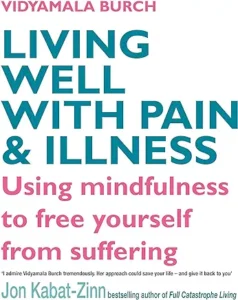 Living Well With Pain And Illness: Using mindfulness to free yourself from suffering
Living Well With Pain And Illness: Using mindfulness to free yourself from suffering
Vidyamala Burch has suffered with chronic pain for over 30 years due to congenital weakness, a car accident and unsuccessful surgery. She is now a wheelchair user. In this positive and reassuring new book, she identifies that it is our resistance to pain which causes it to be so distressing and miserable. We don’t want it to be happening to us, and we wish we weren’t experiencing it.
LIVING WELL WITH PAIN AND ILLNESS is a practical guide to living with and managing chronic pain through the principle of mindfulness. By developing a calm awareness of your body and your pain, you can learn to let go of the frustration and suffering that you associate the pain with, and the pain will reduce.Vidyamala Burch uses easy-to follow breathing techniques and powerful mindfulness meditations which teach you how to live in the present moment. LIVING WELL WITH PAIN AND ILLNESS includes helpful illustrations, offers effective ways of managing chronic pain and is a must-read for all sufferers.
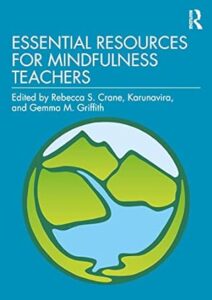 Essential Resources for Mindfulness Teachers offers the reader a wealth of knowledge about the explicit and implicit aspects of mindfulness-based teaching.
Essential Resources for Mindfulness Teachers offers the reader a wealth of knowledge about the explicit and implicit aspects of mindfulness-based teaching.
The book focuses on how to develop the craft of teaching mindfulness-based courses and is divided into three parts. Part I addresses the explicit elements of mindfulness-based courses, such as how to offer meditation practices and inquiry. Part II investigates the subtle but powerful implicit qualities needed within the teacher to convey the essence of mindfulness. Part III is a series of chapters on the underpinnings, considerations, and theories surrounding the teaching of mindfulness-based courses, and includes a new framework for reflective practice – the Mindfulness-Based Interventions: Teaching and Learning Companion (the TLC).
The book is a core companion text for both trainees and established mindfulness-based teachers, and is a resource you will return to again and again.
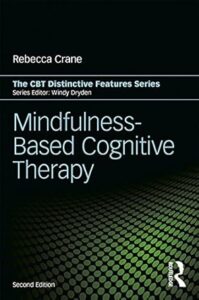 This new edition of Mindfulness-Based Cognitive Therapy: Distinctive Features (MBCT) provides a concise, straightforward overview of MBCT, fully updated to include recent developments. The training process underpinning MBCT is based on mindfulness meditation practice and invites a new orientation towards internal experience as it arises – one that is characterised by acceptance and compassion. The approach supports a recognition that even though difficulty is an intrinsic part of life, it is possible to work with it in new ways.
This new edition of Mindfulness-Based Cognitive Therapy: Distinctive Features (MBCT) provides a concise, straightforward overview of MBCT, fully updated to include recent developments. The training process underpinning MBCT is based on mindfulness meditation practice and invites a new orientation towards internal experience as it arises – one that is characterised by acceptance and compassion. The approach supports a recognition that even though difficulty is an intrinsic part of life, it is possible to work with it in new ways.
The book provides a basis for understanding the key theoretical and practical features of MBCT and retains its accessible and easy-to-use format that made the first edition so popular, with 30 distinctive features that characterise the approach. Mindfulness-Based Cognitive Therapy: Distinctive Features will be essential reading for professionals and trainees in the field. It is an appealing read for both experienced practitioners and newcomers with an interest in MBCT.
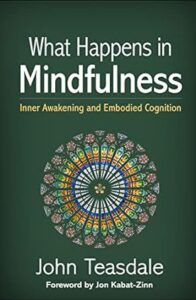 What Happens in Mindfulness: Inner Awakening and Embodied Cognition
What Happens in Mindfulness: Inner Awakening and Embodied Cognition
Well known for applying mindfulness to the treatment of depression, pioneering researcher John Teasdale now explores the broader changes that people can experience through contemplative practices. What goes on in our minds when we are mindful? What does it mean to talk of mindfulness as a way of being? From a scientific perspective, how do core elements of contemplative traditions have their beneficial effects? Teasdale describes two types of knowing that human beings have evolved–conceptual and holistic–intuitive–and shows how mindfulness can achieve a healthier balance between them. He masterfully describes the mechanisms by which this shift in consciousness not only can reduce emotional suffering, but also can lead to greater joy and compassion and a transformed sense of self.
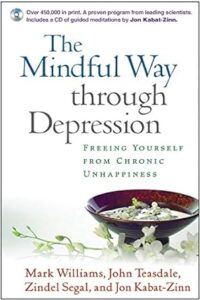 The Mindful Way Through Depression: Freeing Yourself from Chronic Unhappiness
The Mindful Way Through Depression: Freeing Yourself from Chronic Unhappiness
If you’ve ever struggled with depression or know someone who has, take heart: Mindfulness practice is a simple, powerful way to naturally break depression’s self-perpetuating cycle. With The Mindful Way Through Depression, four leading researchers present insightful lessons drawn from both Eastern meditative traditions and cognitive therapy about how to triumph over this illness – and, more importantly, how to prevent it from striking again. Join these uniquely qualified experts to discover the power of mindfulness-based cognitive therapy.
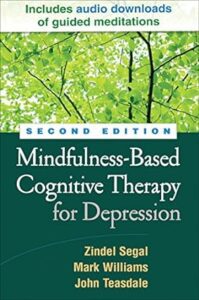 Mindfulness-Based Cognitive Therapy for Depression, Second Edition: A New Approach to Preventing Relapse
Mindfulness-Based Cognitive Therapy for Depression, Second Edition: A New Approach to Preventing Relapse
This acclaimed work, now in a new edition, has introduced tens of thousands of clinicians to mindfulness-based cognitive therapy (MBCT) for depression, an 8-week program with proven effectiveness. Step by step, the authors explain the “whys” and “how-tos” of conducting mindfulness practices and cognitive interventions that have been shown to bolster recovery from depression and prevent relapse. Clinicians are also guided to practice mindfulness themselves, an essential prerequisite to teaching others. Forty-five reproducible handouts are included. Purchasers get access to a companion website featuring downloadable audio recordings of the guided mindfulness practices (meditations and mindful movement), plus all of the reproducibles, ready to download and print in a convenient 8 1/2″ x 11″ size. A separate website for use by clients features the audio recordings only.
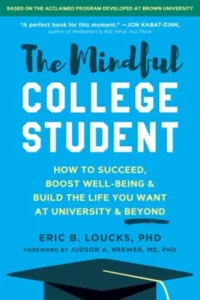 The perfect gift for the college-bound student! Based on the popular Mindfulness-Based College (MBC) program at Brown University, this book offers powerful skills to increase academic success and boost mental, physical, spiritual, and emotional health―now and for a lifetime. College is a time of transition. It’s a time for learning and preparing to make your own way in the world. But if you’re like many teens and young adults, the thought of leaving home and being on your own in a new place can also be intimidating―even overwhelming. That’s why you need a solid foundation to help you manage stress, stay focused, and maintain healthy habits―in body, mind, and spirit. Grounded in evidence-based mindfulness, The Mindful College Student will help you cultivate the cognitive and emotional skills you need to increase well-being and reach your highest aspirations. You’ll also learn positive coping strategies for dealing with stress, sadness, and anxiety―including diet, fitness, and sleep habits. Most importantly, you’ll discover three core self-regulation skills to help steer you toward the life you want: self-awareness, attention control, and emotion regulation. Get ready to take on the world with this fun and informative guide, filled with everything you need to face all of the challenges of college life―and beyond!
The perfect gift for the college-bound student! Based on the popular Mindfulness-Based College (MBC) program at Brown University, this book offers powerful skills to increase academic success and boost mental, physical, spiritual, and emotional health―now and for a lifetime. College is a time of transition. It’s a time for learning and preparing to make your own way in the world. But if you’re like many teens and young adults, the thought of leaving home and being on your own in a new place can also be intimidating―even overwhelming. That’s why you need a solid foundation to help you manage stress, stay focused, and maintain healthy habits―in body, mind, and spirit. Grounded in evidence-based mindfulness, The Mindful College Student will help you cultivate the cognitive and emotional skills you need to increase well-being and reach your highest aspirations. You’ll also learn positive coping strategies for dealing with stress, sadness, and anxiety―including diet, fitness, and sleep habits. Most importantly, you’ll discover three core self-regulation skills to help steer you toward the life you want: self-awareness, attention control, and emotion regulation. Get ready to take on the world with this fun and informative guide, filled with everything you need to face all of the challenges of college life―and beyond!
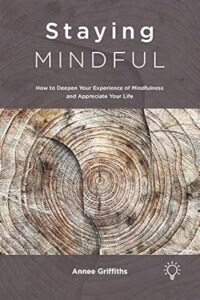 Staying Mindful: How to Deepen Your Experience of Mindfulness and Appreciate Your Life
Staying Mindful: How to Deepen Your Experience of Mindfulness and Appreciate Your Life
Sustaining a mindfulness meditation practice is challenging. Many people complete an eight-week introductory mindfulness course with the best of intentions, only to quickly let things slip as competing pressures take over and the time to stop and think dries up. Tackling this issue, Staying Mindful refreshes and deepens the learning gained in typical introductory courses, and provides a wealth of guidance to encourage and inspire ongoing practice.
Based on a six-week course developed and run for many years by the author, Staying Mindful is the perfect ‘next step’ guide for anyone looking to further develop their mindfulness skills. It introduces new topics such as working with difficulty and gratitude, and more advanced mindfulness practices (such as for managing anxiety). The book as a whole can be used as a self-study course, working through the chapters and practices sequentially, or as a ready resource to dip into as required.
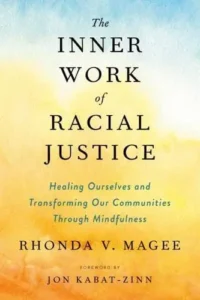 “Illuminates the very heart of social justice and how it might be approached and nurtured through mindfulness practices in community and through the discernment and new degrees of freedom these practices entrain.” –from the foreword by Jon Kabat-Zinn
“Illuminates the very heart of social justice and how it might be approached and nurtured through mindfulness practices in community and through the discernment and new degrees of freedom these practices entrain.” –from the foreword by Jon Kabat-Zinn
In a society where unconscious bias, microaggressions, institutionalized racism, and systemic injustices are so deeply ingrained, healing is an ongoing process. When conflict and division are everyday realities, our instincts tell us to close ranks, to find the safety of those like us, and to blame others. This book profoundly shows that in order to have the difficult conversations required for working toward racial justice, inner work is essential. Through the practice of embodied mindfulness–paying attention to our thoughts, feelings, and physical sensations in an open, nonjudgmental way–we increase our emotional resilience, recognize our own biases, and become less reactive when triggered.
As Sharon Salzberg, New York Times-bestselling author of Real Happiness writes, “Rhonda Magee is a significant new voice I’ve wanted to hear for a long time -a voice both unabashedly powerful and deeply loving in looking at race and racism.” Magee shows that embodied mindfulness calms our fears and helps us to exercise self-compassion. These practices help us to slow down and reflect on microaggressions–to hold them with some objectivity and distance–rather than bury unpleasant experiences so they have a cumulative effect over time. Magee helps us develop the capacity to address the fears and anxieties that would otherwise lead us to re-create patterns of separation and division.
It is only by healing from injustices and dissolving our personal barriers to connection that we develop the ability to view others with compassion and to live in community with people of vastly different backgrounds and viewpoints. Incorporating mindfulness exercises, research, and Magee’s hard-won insights, The Inner Work of Racial Justice offers a road map to a more peaceful world.
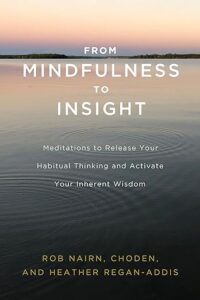 From Mindfulness to Insight: Meditations to Release Your Habitual Thinking and Activate Your Inherent Wisdom
From Mindfulness to Insight: Meditations to Release Your Habitual Thinking and Activate Your Inherent Wisdom
This book shows how we can move beyond secular mindfulness and compassion techniques to the cultivation of insight – seeing into and thereby becoming free of the repetitive thinking that keeps us trapped in cycles of suffering.
Most books in the secular mindfulness tradition stop with mindfulness and self-compassion but do little to uncover the root causes of our suffering. Drawing on both Buddhist analyses of mind and current findings in psychology and neuroscience, the book explains how our thinking becomes fixed and routinized through our engaging with unconscious preferences and reactions.
Through the cultivation of insight, we can disentangle ourselves from these patterns, which leads to greater equanimity, freedom, and compassion.
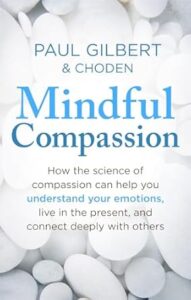 Mindful Compassion
Mindful Compassion
Based on the latest work from Professor Paul Gilbert OBE, bestselling author of The Compassionate Mind, and Buddhist expert Choden.
Professor Gilbert has spent the past twenty years developing a new therapy called Compassion-Focused Therapy (CFT) which has an gained international following. In recent years, mindfulness is being used increasingly to treat common mental health problems such as depression, stress and stress-related insomnia.
In this ground-breaking new book, Professor Gilbert, along with his co-author Choden, combines the best of Compassion-Focused Therapy with the most effective mindfulness techniques. The result is an extremely effective approach to overcoming everyday emotional and psychological problems and improving one’s sense of wellbeing.
 Mindfulness-Based Living Course: A self-help version of the popular Mindfulness eight-week course, emphasising kindness and self-compassion, including guided meditations
Mindfulness-Based Living Course: A self-help version of the popular Mindfulness eight-week course, emphasising kindness and self-compassion, including guided meditations
A self-help version of the popular Mindfulness eight-week course, emphasising kindness and self-compassion. Mindfulness is an innate capacity of the mind that can be trained to alleviate stress and low mood, to reduce the power of rumination and self-criticism, and to evoke emotional well-being and proactivity. The Mindfulness-Based Living Course is a practical guide to the development of a mindful approach to living in the modern world. Its distinctive feature is a compassionate approach to mindfulness that is based on many years of experience in the practice and delivery of mindfulness training by two of its leading exponents – the former Buddhist monk Choden and Heather Regan-Addis, both directors of the Mindfulness Association.
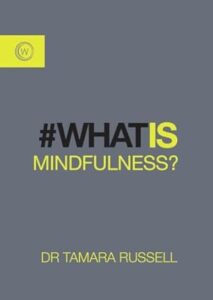 What Is Mindfulness?
What Is Mindfulness?
Mindfulness is finally in the eye of the public storm, but with that storm come misconceptions. Neuroscientist, clinical psychologist and mindfulness teacher Dr. Tamara Russell will guide you through and demystify the true and poignant nature and health benefits of mindfulness, allowing you to understand how one thing has helped so many people to tame their racing minds and live with awareness, including:
#What does mindfulness really mean and what are the benefits?
#How does it actually work?
#Where does it come from?
#How can I get the most from it?
#What are the future possibilities with it?
All in the form of a decisive Q&A format, coupled with practical exercises that will let you explore the art of mindfulness, What is Mindfulness will take you behind the scenes of this life-changing practice.
-
Dark retreats: Sensory deprivation and mindfulness practice Marcin Czub
-
Creating Wellbeing: The Introduction of Mindfulness Programmes Within The Glasgow School of Art Marjory Bond
-
Three stories of combing poetry and mindfulness to create new inclusive learning spaces in higher education Terry Barrett
-
Effects of Brief Mindfulness Practice on Psychological Health Outcomes: Does Frequency of Practices Matter? Paveen Phon Amnuaisuk
-
The effect of an adapted Mindfulness-Based Stress Reduction program on mental health, prenatal attachment and birth outcomes in pregnant women with a preconception history of mental disorders: a study protocol for a randomized controlled trial in a Danish hospital-based outpatient setting Sine Skovbjerg
-
Enhancing Mindfulness Teaching and Research with the Mindful Brian App: A Grassroots Approach Stephan Schoenig
-
Exploring the Impact of Mindfulness on Classroom Experiences, Teacher-Student Relationships, and Student Mindfulness: A Teacher Educator's Self Study Yeh Chen Kuo
-
Mindfulness as an intervention for self- regulation and school reintegration in a trauma -informed primary school post Covid -19 lockdown Katrina Diamond
-
The Impact of Short-term Mindfulness Practice on Prospective Memory and Working Memory Yuan Huei Lin
-
Teaching mindfulness-based programmes online: Teacher demographics, perceived costs, and benefits. Alison Burton
-
Clinical Training and Supervision: A Mindful Approach Jamie E. Banker
-
Mindfulness as ethical foundations in teaching profession: Exploring the views of pre-service and in-service teachers in Hong Kong Ngarsze Lau
-
Mindfulness Adult ESL and Health Literacy eBook Project Shelita Birchett Benash
-
Reducing foreign language anxiety in a mindfulness-integrated university English classroom: An ethnographic observation Hazel Yang Hui
-
Investigating the relationship between mindfulness and selflessness in adolescents. Nina Zammit
-
For Whom Does a Brief Mindfulness Induction Work? An exploration of the moderating role of individual differences in the effect of mindfulness induction on executive function and mind-wandering Ke Shi
-
Beyond Monolithic Support: Interpersonal Style Mediates the Link Between Mindfulness and Support Behavior. Wei-Fang Lin
-
Stroke survivors’ experiences of mindfulness-based interventions and yoga: a qualitative systematic review and meta-aggregation Naomi Clark
-
Participants Experiences Following a Mindfulness Based Intervention for University Students; A Qualitative Study Catherine Doody
-
Effects of mindfulness-based cognitive therapy on personal recovery in psychiatric day treatment with return to work in Japan: a non-randomized controlled trial with a control group. Aya Midorikawa
MINDFUL WALK
Join us for a Mindful Walk on Sunday morning 4 August from 7:45 to 8:45, departing from Pontio reception. Our guide will be Sholto Radford - a Senior Clinical Psychologist who previously worked and trained at the Centre for Mindfulness Research and Practice. He has a love of the outdoors and ran guided mindfulness walks and outdoor retreats in North Wales. He is the Author of Walk a book exploring the practice of mindfulness in this context..
Please wear suitable footwear and waterproof outdoor clothing. This will be an hour-long guided walk and an opportunity to practice mindfulness through movement and awareness of the senses.
conference events at BWYD DA BANGOr
BDB is an ethically and environmentally sustainable not-for-profit café, deli and bistro that aims to showcase the best in local, seasonal organic produce whilst supporting the local community to tackle issues such as food poverty, social isolation and providing a creative space for local musicians and artists to express their talents. They are arranging a series of Events and Menus specifically for ICM:2024! Find out more - booking is strongly advised!



